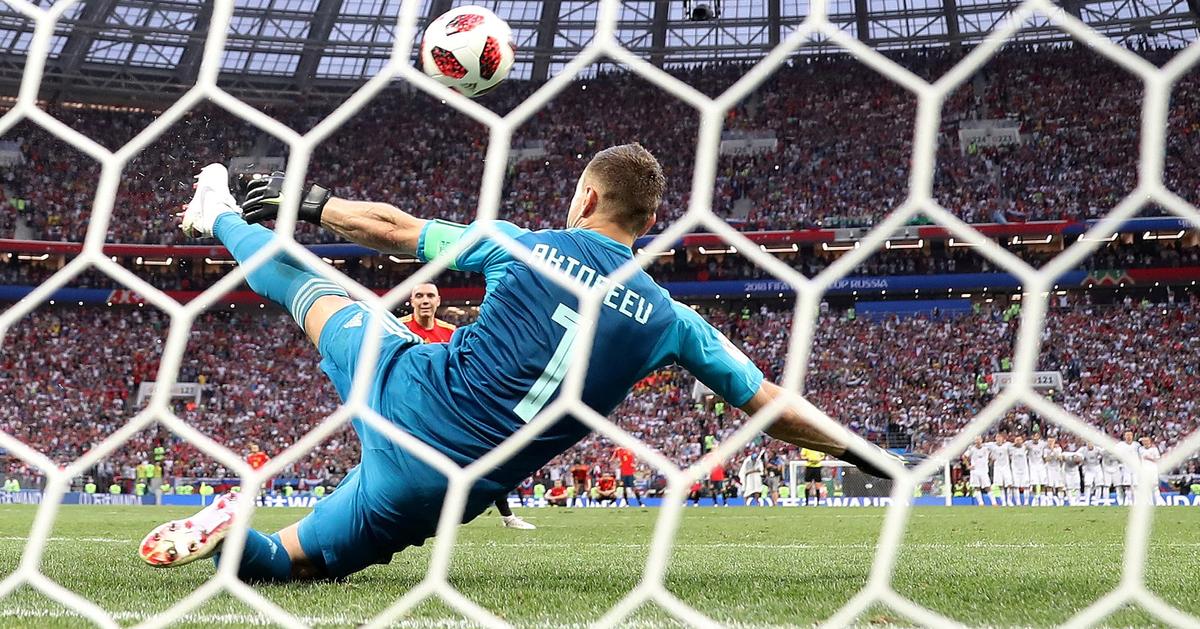REUTERS/Carl Recine
After 120 minutes of football at the Luzhniki Stadium, it came down to one kick. Iago Aspas versus Igor Akinfeev. If Aspas scored, Spain would be through to the quarter-finals. If he missed, it would be disaster for the 2010 World Cup champions. The forward bent his run-up and shot with his left foot. Akinfeev stuck out a boot and sent the host nation into delirium.
Russia had pulled off one of the biggest results of the World Cup so far. But the fact Spain even needed a penalty shoot-out to progress against the lowest-ranked team in the tournament demonstrates there were deeper problems at play for La Roja.
So how did it come to this for a side who were among the pre-tournament favourites?
The Lopetegui situation changed everything
Spain were in turmoil from the moment they touched down in Russia. Two days before the start of the World Cup, Real Madrid announced Julen Lopetegui was joining the club after the tournament, just three weeks after the manager had renewed his Spain contract until 2020. Which might not have been an issue, except the president of the Spanish Football Federation Luis Rubiales was only informed five minutes beforehand.
Lopetegui was the manager who picked Spain up from the ashes of Brazil and France, with his mantra of evolution rather than revolution. The former Under-19, Under-20 and Under-21 manager had built on the passing foundations of the all-conquering 2008-2012 team while injecting this side with more attacking bite. He had also done what Vicente del Bosque had failed to do in 2014 and 2016 by blending in new talent from his time in charge of Spain’s youth teams.
The high point came in a 6-1 rout of Argentina in a March friendly. Everything seemed to click for Lopetegui’s outfit, with Isco scoring a hat-trick – Spain’s first since 2013 – to cement his status as the most important player in the side. It looked as if the Madrid magician and his teammates would take some stopping in Russia after that performance.
REUTERS/Juan Medina
They were left managerless, however, when Rubiales took the decision to sack Lopetegui following Real's announcement. The president spoke about values, and it was clear the news had embarrassed Rubiales. He emphasised the need to change as little as possible, but he had already made the biggest change possible with two days to go before Spain’s opening match against Portugal.
While director of football and former Spain captain Fernando Hierro was probably the most sensible replacement in the circumstances, this was a huge role for someone whose only previous managerial experience was with second division Real Oviedo. Hierro said as much when he told a radio station he was not even thinking of the position a few days before, but his inexperience showed in his tactics and in-game decisions over Spain’s four games.
Regardless of how good this squad was, the atmosphere had an effect. Basic errors crept into Spain’s game; De Gea spilled Ronaldo’s shot in the group opener against Portugal, Morocco punished Ramos' complacency and Pique gave away a penalty after a bizarre handball in the Round of 16 clash with Russia. Spain topped their group despite these mistakes but it was inevitable they would come back to haunt them at some point.
And all this without mentioning the catalyst for the crisis: Florentino Perez. While Lopetegui, Rubiales and Hierro could have handled the situation better, it could all have been so easily avoided had Real Madrid waited until after the tournament to approach the Spain manager. It was telling that Perez was omitted from Marca’s poll asking who was most to blame – the only options were Rubiales, Hierro, and the players – but the Madrid president must take some responsibility for Spain’s doomed campaign.
But their football was poor
Whenever Spain lose at international tournaments, there is always a rush to declare the death of possession football. In 2014 it was their group stage exit in Brazil and in 2016 their round of 16 defeat to Italy in France which seemed to signal the end of an era for Spain and international football in general.
While Spain were impressive in their opening group match against Portugal, with some labelling them the team of the round, they were average at best against Iran, Morocco and Russia. Against the hosts they were pedestrian, playing as if they were 3-0 up rather than defending a 1-0 lead.
The worst criticism that can be made of Spain is that this was possession for possession’s sake. They set a new record with 1,029 successful passes in Moscow, but they could not break the Russians down. That Russia have completed 1,029 passes exactly in this World Cup so far just goes to show how Spain’s possession counted for little.
Explore new topics and discover content that's right for you!
News



